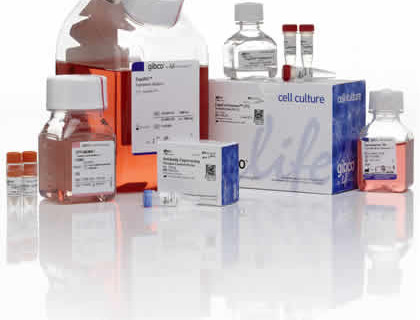
Can Stable Expression Levels be Achieved in a Transient Expression System – Expi293
In my previous blog “Innovative Products from the ASCB Conference – Part I,” I highlighted a new product from Life Technologies – the Expi293 Transient Expression System. Launched last September, it combines specialized media, lipofectamine technology, and molecular biology to create a transient transfection system with titers that approach stable expression system yield.
Everyone knows that stable expression systems provide the greatest chance for high expression of proteins; of course the downside is significant time (weeks or months), and resources to develop this type of system. While obviously necessary if moving to large- scale manufacturing, stable expression systems are not usually suitable for early drug discovery and development. The time necessary to develop a stable line would slow drug discovery and development by delaying go/no-go decisions and committing valuable resources to proteins that are still unproven.
To address this challenge, over the past decade scalable transient expression systems have been developed to provide the opportunity to produce smaller amounts of proteins faster and allow small scale manufacturing of many proteins at once. Thus enabling researchers to manufacture milligrams to hundreds of milligrams of protein quickly, typically within a week. However transient expression systems also have problems including the inability to produce larger amounts of protein in lower volumes, achieve consistent protein quality, improve on production cost, and address “non-starters” or proteins that are not able to be expressed in transient systems.
Expi293 Expression System
Life Technologies has created the Expi293 Expression System to address these common challenges to transient expression and I am pleased to share the following guest blog by Henry Chiou, Product Manager for Expi293, to explain the system in more detail.
Specialized Expression Media
The Expi293 Expression System was developed as a next generation transient expression system that employs a high cell culture density strategy to increase protein yield within a short amount of time while maintaining consistent high protein quality. The Expi293 Expression System includes a specialized media for high density culture that supports all stages of culture including initial cell growth, transfection, and protein expression. The media is chemically defined, animal origin free, and protein free. Expi293 Expression Media can support cell densities at 14-18 million cells per milliliter, which is a significant improvement over the FreeStyle system that reaches maximal densities of 4-5 million cells per milliliter (see Figure 1).
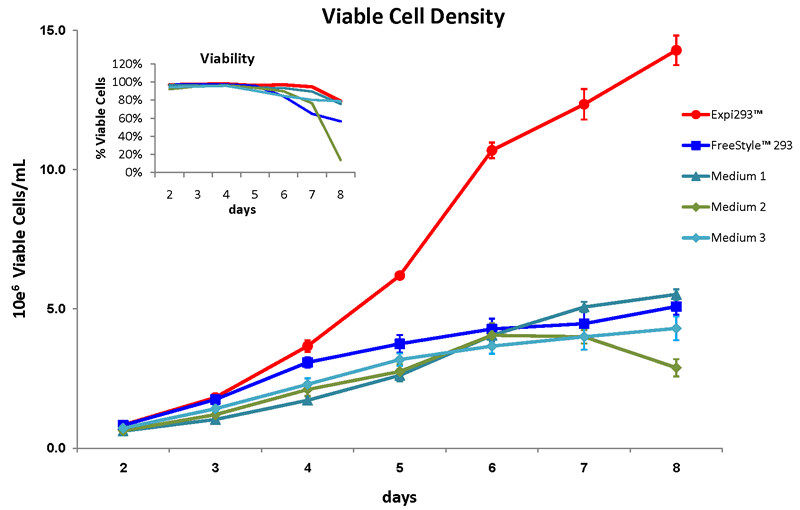
High Productivity Cells
Developing a medium to maintain high density culture was the first step, the second component in the Expi293 Expression System is the Expi293F cells isolated specifically for higher per cell productivity in high density culture. In developing the Expi293F cells, FreeStyle 293F cells were adapted into the Expi293 expression medium. While these cells exhibited higher productivity simply by being cultured in the specialized Expi293 medium, a population of cells was identified that had adapted better and demonstrated desired characteristics including, faster growth, greater culture densities, and higher cell viabilities. These cells were selected as Expi293F cells and exhibit doubling times that are on average 2-3 hours shorter and improved culture viability of 97.5-99%. Expi293F cells also have per cell productivity that is 30-40% higher than standard 293F cells adapted into Expi293 medium. Resulting protein yield from the Expi293F cells has exceeded titers of 1 gram per liter (see Figure 2). If researchers are required to use their own HEK293 cells, increased performance can be expected when cultured in Expi293 expression medium, however the magnitude of improvement is dependent on the cells themselves.
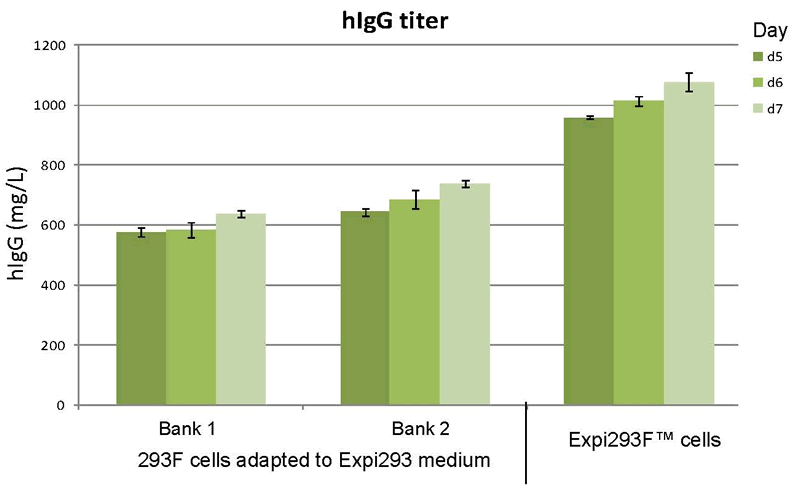
Optimized Transfection Reagent
The third component of the Expi293 system is the ExpiFectamine transfection reagent specifically designed to maintain high transfection efficiencies in high density culture. Using ExpiFectamine, 80-90% transfection efficiency has been achieved (Figure 3). In addition, ExpiFectamine transfection enhancers 1 and 2 were developed to push expression levels in high density situations. The use of transfection enhancers 1 and 2 have enabled up to a three-fold improvement in expression (Figure 4).
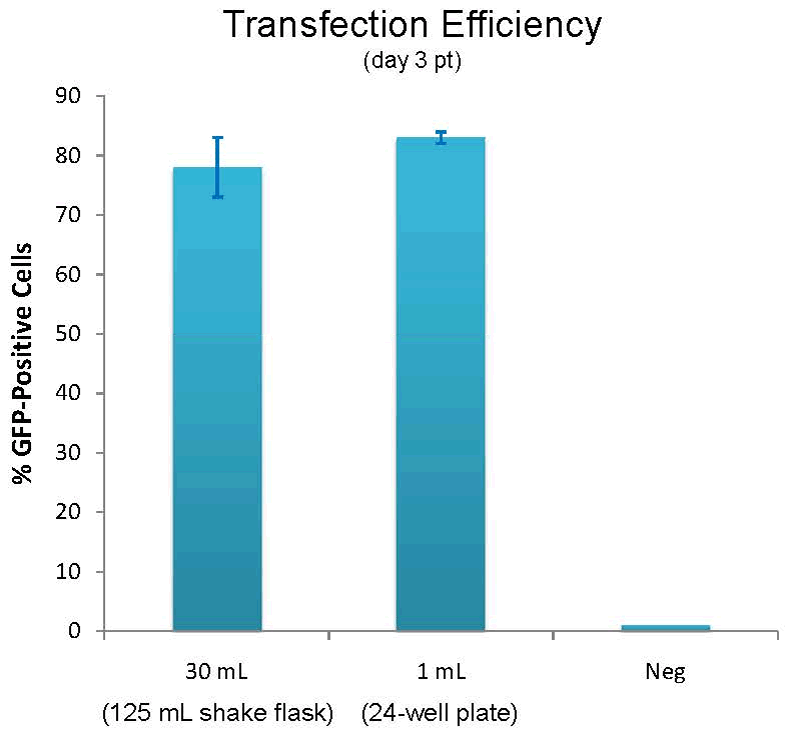
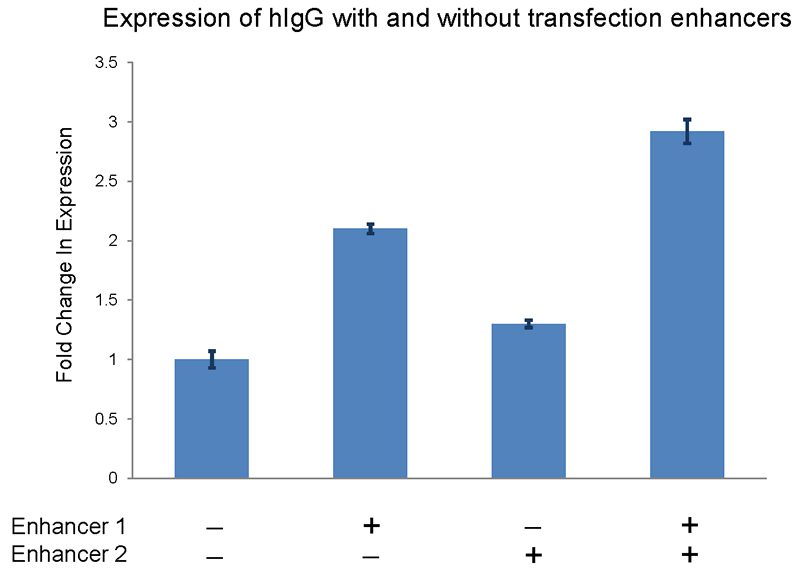
Scalable Transient Culture
The Expi293 system has also been tested for scalability. It has been successfully scaled down to microplate format and scaled up to multi-liter transfections with consistent high yield across a wide range of culture sizes (Figure 5).
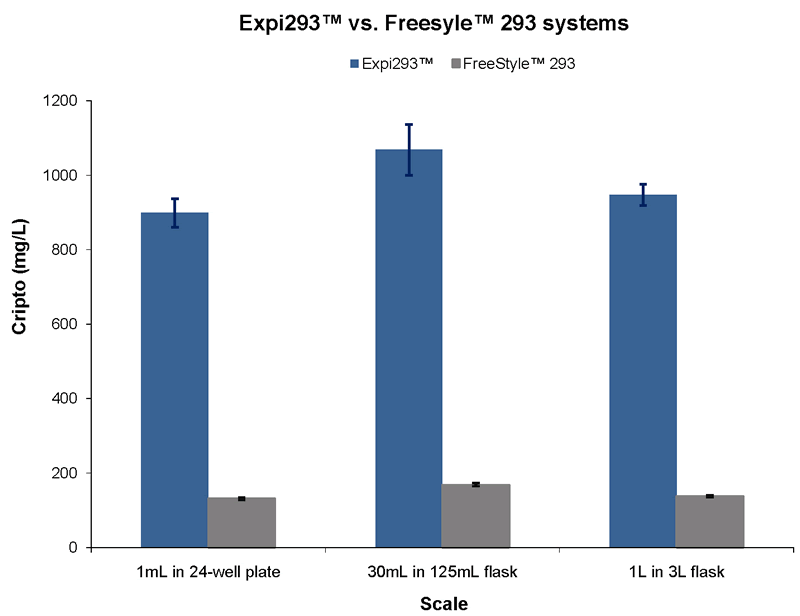
Consistent Product Quality
To ensure equivalent product quality, the Expi293 system was compared with the FreeStyle system and tested for equivalent protein functionality and quality. IgG produced in both systems was evaluated for functionality and was found to have equivalent reactivity against target and equivalent glycosylation profiles. EPO was also produced in both systems and the activity was identical in TF-1 cell-based proliferation assay. GPCR manufactured in both had comparable and physiological antagonist binding activity.
In the development of the Expi293 system, Life Technologies employed both internal and external testing sites. Approximately 100 proteins were tested at the external sites and 87% of them demonstrated increased expression when using the Expi293 Expression System. Results showed on average, a 4.6X increased expression. In both internal and external testing, the increased protein yield and utilization of less culture volume created a cost effective, efficient, and flexible system. For example, using the Expi293 system allowed researchers to produce larger amounts of protein in less volume thereby reducing time, dedication of equipment, and tissue culture and cultureware products. By freeing up valuable incubator space, researchers also had the option of producing several additional proteins simultaneously.
The Expi293 system is the latest evolution of transient transfection technology in an easy to use and complete system. Expi293’s ease of use, flexibility, and efficiencies provide researchers a straightforward, cost effective method for improving protein production.